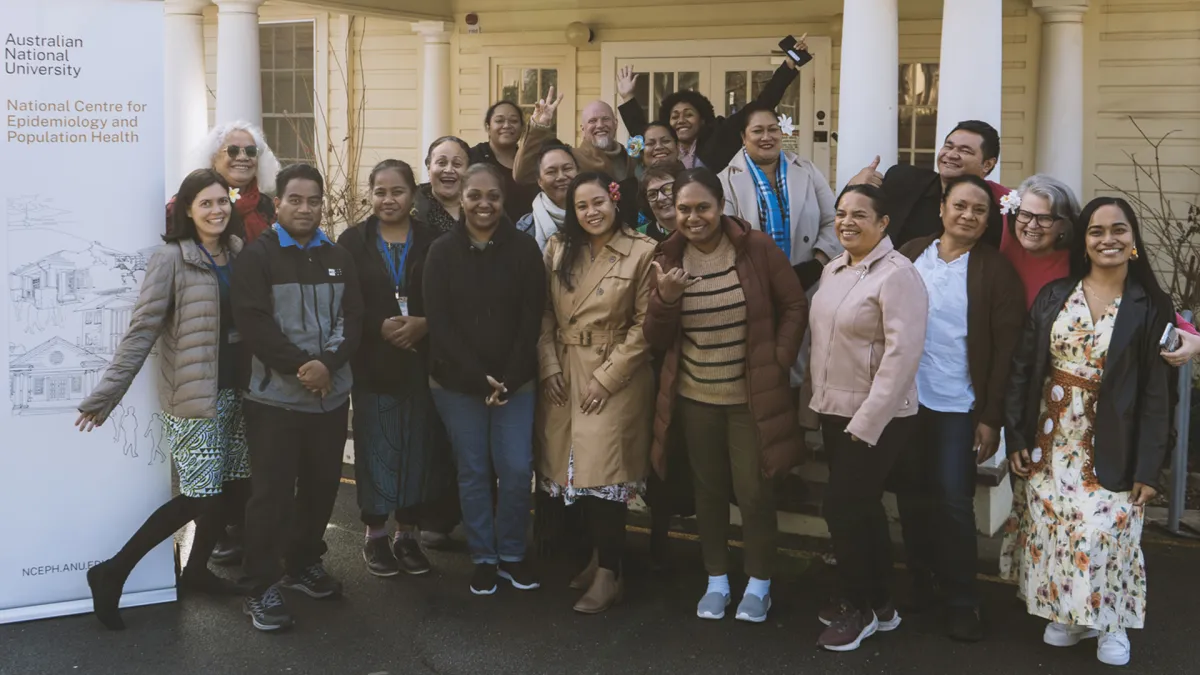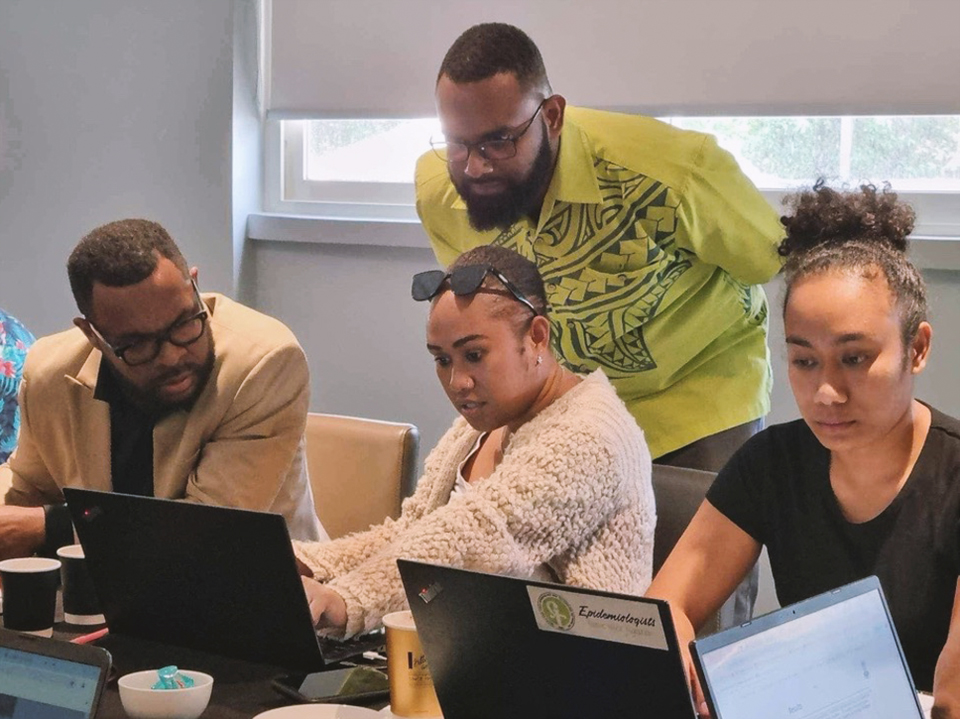ANU helps strengthen epidemiology workforce in the Pacific

The COVID-19 pandemic demonstrated just how interconnected our world is — health security doesn’t start and stop at our border.
The pandemic also highlighted the differing capacities of our Pacific Island neighbours with respect to surveillance and outbreak response, according to epidemiologist Dr Rosalina Sa'aga-Banuve.
Dr Sa’aga-Banuve emphasises the need to bolster field epidemiology training and resources across the Pacific and parts of the Southeast Asian regions. This will ensure health threats including outbreaks and public health emergencies can be dealt with quickly and effectively.
“It’s all about global health security,” says Dr Sa’aga-Banuve. “We know the workforce is small in the Pacific and, other than in Papua New Guinea, there are no established field epidemiological training programs in place there.”
Dr Sa’aga-Banuve and her team have now secured a $7.5 million grant from the Department of Foreign Affairs and Trade (DFAT) to develop and support a strong epidemiology workforce in these regions through the Pacific Evidence for Informed Policies and Programs Plus (Pac-EVIPP+).
Over the next four years, the Pac-EVIPP+ team will work with local Ministries of Health, The Pacific Community (SPC), and Fiji National University (FNU) to deliver field epidemiology training across the Pacific.
Pac-EVIPP+ will focus on countries where the need is greater: the Cook Islands, Fiji, Kiribati, Nauru, Niue, Samoa, Solomon Islands, Tonga, Tokelau, Tuvalu, and Vanuatu. This program also supports Lao PDR and Cambodia in the Southeast Asia region to deliver selected components of the program.
“Dr Rosa is a Pacific Islander with a wealth of experience in the region,” says Pac-EVIPP+ researcher Polly Wallace, “She has a wide network of people in the Pacific that she has established good working relationship with. Along with her network, Rosa’s knowledge and deep understanding of the Pacific region allows us to work collaboratively to address the identified priorities of each country.”
Laying the groundwork
The Pac-EVIPP+ team currently supports SPC in the delivery of FNU’s Postgraduate Certificate in Field Epidemiology across the Pacific. This course uses teaching materials adapted from the US Centers for Disease Control curriculum to be relevant in the Pacific and includes a focus on regional issues such as the impact of climate change on infectious disease, One Health, and extreme weather events.
Mr Samuel Posikai Tapo, Acting Director General, for the Vanuatu Ministry of Health, is impressed with the Pac-EVIPP+ training program to date, saying “our senior health officers will now have improved skills and capacity in research, and it will broaden their knowledge in innovative ways to address diseases in Vanuatu."
Dr Sa’aga-Banuve notes the Ministries of Health have chosen very capable and experienced health professionals to attend these workshops, and this lays the foundation for building and retaining a strong epidemiology workforce in the future. Up to six fellowships will be awarded to Pacific Islanders to undertake the Master of Philosophy in Applied Epidemiology here at ANU with the first two starting in 2025.

The Postgraduate Certificate in Field Epidemiology (PGCFE) training in Vanuatu. Image: supplied
Training the leaders
Developing in-country leaders is critical in growing and retaining a strong applied epidemiology workforce. As such, in addition to teaching technical epidemiology skills, the Pac-EVIPP+ program also supports leadership training tailored for these countries. This teaching includes ‘soft skills’ required for communication, negotiation, collaborative leadership, conflict resolution and executive management. To date, 48 Pacific Islanders have undertaken leadership training.
One of the rising leaders is Dr Daniel Faktaufon, Principal Medical Officer at the Fiji Centre for Disease Control.
Engaged in Fiji’s battle against the COVID-19 pandemic and several epidemics, Dr Faktaufon has developed an appreciation of and keen interest in field epidemiology.
“There were not that many frequent outbreaks in the Pacific and in Fiji in the past, but now we see more dengue outbreaks, very frequent leptospirosis outbreaks and typhoid as well,” says Dr Faktaufon.
With climate change fuelling a rise in infectious disease outbreaks, Dr Faktaufon emphasises the need to build core capabilities in field investigations and response. To this end, he has taken part in previous regional training run by ANU, and is undertaking a Master of Philosophy in Applied Epidemiology (MAE).
This year, he also co-facilitated the Pac-EVIPP+ leadership training held at ANU.
“It's important to have good leadership in your departments and health facilities to ensure that your teams are able to be productive and have quality output. But specialised training on leadership, on how to be a good leader and the qualities of being a good leader, is lacking in many public health training courses,” says Dr Faktaufon.
Dr Sa'aga-Banuve says Dr Faktaufon's co-facilitating Pac-EVIPP+ training is an example of how the program is helping increase the region’s capacity to train and grow their health workforce.
Valuing local connections and culture
According to Dr Sa'aga-Banuve, regional collaboration for all program content and teaching is crucial in building and maintaining a Pacific field epidemiology workforce. Dr Faktaufon agrees, saying this provides a sense of relevance and ownership locally.
Tailored leadership training modules will later be delivered by alumni who have completed the training and had the opportunity to put their learnings into action. These alumni will also form the basis of formal mentoring, communities of practice, and coaching community in their home countries.
“I think it's really important because it makes you feel that once you completed this program, there's this sense of ownership going back into your country and implementing what you have learnt within your home country,” says Dr Faktaufon.
The “real heavy-lifting” however, is the individual mentoring of students after they complete the postgraduate degree as they use their learnings to undertake research projects and increase other skills, according to Dr Sa'aga-Banuve.
This is currently being led by the Pac-EVIPP+ team, but they are confident it won’t always be this way.
“It’s a whole process of strengthening in-country workforce and advancing the skills of in-country officers,” remarks Ms Wallace.
“While our mentorship is important right now, we hope it will ultimately be replaced by experienced epidemiologists in-country. That is the aim of this project.”
Find out more about the Pac-EVIPP+ work by visiting their project website.
